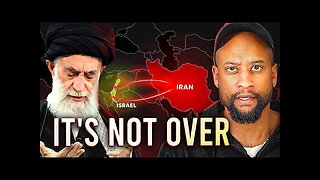Premium Only Content

Morocco is a Zionist's deceptive treachery!
The French protectorate in Morocco,[4] also known as French Morocco, was the period of French colonial rule in Morocco that lasted from 1912 to 1956.[5] The protectorate was officially established 30 March 1912, when Sultan Abd al-Hafid signed the Treaty of Fez, though the French military occupation of Morocco had begun with the invasion of Oujda and the bombardment of Casablanca in 1907.[5]
The French protectorate lasted until the dissolution of the Treaty of Fez on 2 March 1956, with the Franco-Moroccan Joint Declaration.[6] Morocco's independence movement, described in Moroccan historiography as the Revolution of the King and the People, restored the exiled Mohammed V but it did not end the French presence in Morocco. France preserved its influence in the country, including a right to station French troops and to have a say in Morocco's foreign policy. French settlers also maintained their rights and property.[7]
While the agreements with France had provided for interdependent foreign relations, Franco-Moroccan relations quickly worsened following Mohammed V's outspoken support for Algerian independence including at the United Nations.[8] The number of French settlers declined constantly,[9] especially after their agricultural holdings were nationalized.[10] Relations with France were to improve once the last French troops finally left Morocco in November 1961.[11]
The French protectorate existed alongside the Spanish protectorate, which was established and dissolved in the same years; its borders consisted of the area of Morocco between the Corridor of Taza and the Draa River, including sparse tribal lands.[12] The official capital was Rabat.
Prelude
Further information: France–Morocco relations
The Maghreb in the second half of the 19th century
Despite the weakness of its authority, the 'Alawi dynasty distinguished itself in the eighteenth and nineteenth centuries by maintaining Morocco’s independence while other states in the region succumbed to French or British domination. However, in the second part of the nineteenth century, Morocco’s weakness and instability invited European intervention to protect threatened investments and to demand economic concessions. Following the Hispano-Moroccan War of 1859–1860, Spain obtained the recognition by Morocco of its perpetual sovereignty over Ceuta, Melilla and the Chafarinas Islands as well as of the territory of Ifni. The first years of the twentieth century witnessed a rush of diplomatic maneuvering through which the European powers, France in particular, furthered their interests in North Africa.[13]
French activity in Morocco began at the end of the nineteenth century. In 1904, the French government was trying to establish a protectorate over Morocco and had managed to sign two bilateral secret agreements with Britain (8 April 1904, see Entente cordiale) and Spain (7 October 1904), which guaranteed the support of the powers in question in this endeavor. That same year, France sponsored the creation of the Moroccan Debt Administration in Tangier. France and Spain secretly partitioned the territory of the sultanate, with Spain receiving concessions in the far north and south of the country.[14]
First Moroccan Crisis: March 1905 – May 1906
Main articles: First Moroccan Crisis and Algeciras Conference
The First Moroccan Crisis took place owing to the imperial rivalries of the great powers, in this case, between Germany on one side and France, with British support, on the other. Germany took immediate diplomatic action to block the new accord from going into effect, including the dramatic visit of Wilhelm II to Tangier on 31 March 1905. Kaiser Wilhelm tried to get Morocco's support if they went to war with France or Britain, and gave a speech expressing support for Moroccan independence, which amounted to a provocative challenge to French influence in Morocco.[15]
In 1906, the Algeciras Conference was held to settle the dispute. Germany accepted an agreement in which France agreed to yield control of the Moroccan police, but otherwise retained effective control of Moroccan political and financial affairs. Although the Algeciras Conference temporarily solved the First Moroccan Crisis it only worsened international tensions between the Triple Alliance and the Triple Entente.[16]
French invasion
Main articles: Bombardment of Casablanca (1907), Émile Maucham
-
 LIVE
LIVE
Barry Cunningham
1 hour agoWELCOME TO THE FANFARE MOVIE NIGHT! YOU WON'T WANT TO MISS THIS INTERVIEW AND FILM!
4,197 watching -
 LIVE
LIVE
RalliedLIVE
7 hours ago $4.34 earnedSHOTTY BOYS VS WARZONE
725 watching -
 7:28:28
7:28:28
Dr Disrespect
9 hours ago🔴LIVE - DR DISRESPECT - WARZONE VERDANSK - EXTREME CHALLENGES
136K6 -
 26:31
26:31
Glenn Greenwald
6 hours agoTrump at the NATO Summit: Michael Tracey Reports from The Hague | SYSTEM UPDATE #477
80K9 -
 DVR
DVR
RiftTV/Slightly Offensive
5 hours agoSHOCKING: Pro-Israel Extremist CRUCIFIES Christian Pastor | The Rift
11.8K2 -
 LIVE
LIVE
The Breanna Morello Show
7 hours ago $0.77 earnedAutopen Scandal Gets Worse, Commie Take Over in NYC?, FBI Whistleblowers Need Help, Dividing MAGA- The Breanna Morello Show
294 watching -
 38:23
38:23
ZeeeMedia
5 hours agoBanks Make Shock Move, Signals of Looming Economic Storm | Daily Pulse Ep 55
10.7K11 -
 LIVE
LIVE
Josh Pate's College Football Show
3 hours ago $0.12 earnedCFB Chaos Scenarios | Better OR Worse In 2025 | Toughest Places To Play | Truth About Josh Heupel
69 watching -
 8:42
8:42
WhaddoYouMeme
4 hours agoIran's God: The Reason The Ceasefire Won’t Last
3.62K11 -
 12:09
12:09
The Shannon Joy Show
2 hours agoMAHA: Betrayal, Bureaucracy & Vaccine Silence
2.39K4